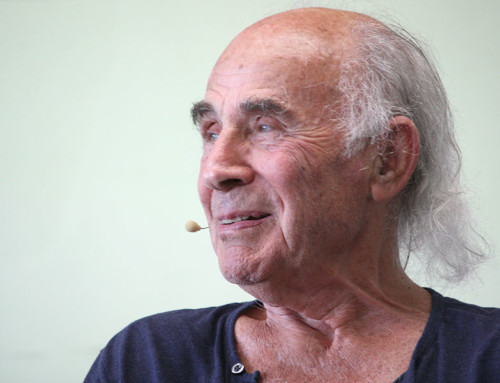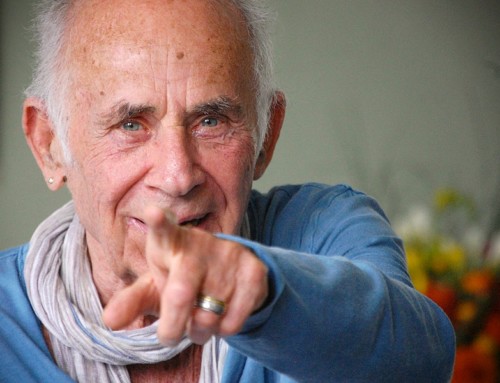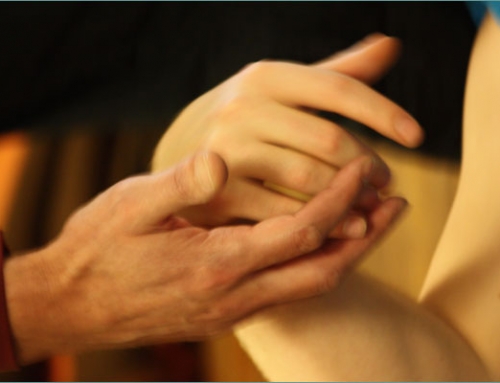Talk
Weekend Group
Salzburg, Austria
26th of October 2012
28th in the series ‘The Whispering Waters.’
There was a great master last century, who died in 1947, some of you will have heard his name because it is not easily forgotten, his name was George Gurdjieff. He came originally from Armenia, the Caucasus, but he spent most of his mature working life in France, in Paris. He said a lot of true things, and one of the things he said was,
‘Man’ – and he doesn’t exclude women in that, he means mankind – ‘is a machine, and if he doesn’t know that about himself, then he doesn’t know anything about himself at all.’
So do you realize that you are a machine? If you follow social conventions, like truth, that is machine-like. If you follow your acquired habits through life – again and again, that is machine-like. If you follow the principles of a written religion, then you are machine-like. If you follow anybody’s system, then you are machine-like. If you maintain your neuroses, which we all have, then you are machine-like. If you always resent being told something negative, or some criticism or correction to yourself, then you are machine-like. If you react to criticism, then you are just a machine. If you behave in a situation exactly like you did before, then, not necessarily but probably, that is machine-like too. But to escape from all the machines in us is very difficult. Very difficult.
Another great master who made many, many great statements was the Buddha, and one can quote him ten thousand times, and one of those ten thousand great quotes is this one, he said about himself, ‘Buddha cries, ‘Halt.’’ He means ‘Stop the machine working. Stop letting the machine run your life.’ And if you do, what happens?
At first it is almost impossible to do, but not quite, and if you do manage it, what then? Well, if you consider this, if you took away then all the things that you have adopted in your life, all these things I mentioned: habits, conventions, belief systems – we’ve all acquired them in our life, we weren’t born with them – somehow, on some level, empty everything that we have acquired out of our presence in the moment, then, in some way, you would have to go to where you were when you were born.
I am sure there are many mothers and fathers here who have had the joy of bringing a child into the world, and when a baby child looks out on the world it doesn’t see what we see any more. In a way it sees a sea of different energies, and then he or she is taught that this part of the sea is called ‘Papa’, and that part of the sea is called ‘Mama’, and this part of the sea is called ‘Auntie Joan’, and this part of the sea is called ‘Uncle Felix.’ And the kid says, ‘Aha, okay, if you say so.’
So if we were able to drop everything which has been imposed on us, and which we have bought, and which we live by, then you would have to return to something which we call the Source.
Really, in a way, we are always at that Source but we never experience it, because on top of that Source all this furniture has been arrayed, and then we find ourselves at the top of the furniture. If you can clear the furniture away, or stop giving energy to the furniture, then you can come to the Source.
The furniture that I am talking about is not solid like this table and chair, it only exists as long as we sit on the chair and use the table. If I don’t use this chair or this table, then the table and chair remain here. If we don’t use all the furniture that has been dumped on us, or that we bought, in our lives, then it would disappear.
Well, it won’t entirely disappear but it would become transparent, it wouldn’t disappear but it would, practically, dissolve, so that you can penetrate it again and go back to the place that was there before the furniture started to build up in you.
What you are left with then is the fear that if we don’t have any furniture then we don’t have any existence, that we are the furniture. I’m saying that that it is not true. We have become so identified with that as who we are that everybody has a fear of dumping it, of taking away our relationship with it. It’s simply a relationship – we think that it is us but it is not, we have a relationship with it.
Your belief system is not you, you have adopted it. The way that you function is not you, it has simply developed in you and you have identified with it. All your protective mechanisms, your defence mechanisms have developed – but they are not you. The fear is that if we lose them all that we become a vacuum, a nobody – a perfect nobody. (Michael laughs.)
But if nothing – like our habits, and our belief systems, and our ambitions – motivates us, moves us into action, into exchange, into intercourse and interaction, then, if we take them away, what will move us? They are what drives us, mostly – our past lived through this furniture is just a continuation of what we have built – so what will move us, what will motivate us, what incentive will there be to do anything if we take that away?
Well, when you came into the world where did you come from? I mean by that – you were naked physically, of course – but were you altogether naked? Did you come without any connections, without any history, without any background, without any relationship with anything else? Were you born in a vacuum? Some people would say, ‘Yes.’ Then, because we are born in a vacuum, we have to find all this stuff for us to take shape, to become a human being. That’s how some people see it: that we have to acquire all these habits and conventions and to have a purpose, that we have to create a purpose and have aims, otherwise we have no life.
Spirituality is about denying all that, and saying that there is a connection, there always was, that it was there when we were born and has always remained in our lives, and that we can find it again, and that connection will be a new source of a new life. That’s what the word means religion from the Latin religare means, to reconnect.
To be religious, in a way, has nothing to do with being a member of a particular religion. It is not that some great truths have not been contained in great religions, because certainly they have, but if you just take one en bloc and say, ‘I am a member of this religion, and I do what this religion has already decided is the right way to live,’ then you are a machine, maybe a religious machine, but still a machine. Many members of the Islam religion are machines so they can kill innocent people and feel that this is their duty, ‘God is great.’ – whoever that God could possibly be.
So it is about reconnecting, and you have to have some feeling, or faith, or even some experience that there is something to reconnect with, and that if you reconnect with it then you can be free. Free? Free of what? Free of all those things that I mentioned, and many other things I didn’t mention, that are encapsulating your life.
In this instant, and this instant, and this instant, and every instant, if you are with this instant innocently: without any thoughts about this instant, without any furniture filling this instant, if you are just with the life that is in you, and all around you, in this instant – then you are free. There is nothing there to imprison you.
In a way, we don’t know where this instant is coming from, it is popping up and you are in it, and nothing can get between that popping up of this moment and you being in this moment. Nothing can get in there – unless you let it.
Have a look. Not this minute as your head says, but this next beat of your heart, this next breath, this experience of tingling somewhere, even pain somewhere, something that is immediately present, and you are with it consciously, whatever that is. This personal happening that is going on this instant, what can possibly interfere with that?
What can pollute that? So it is pure, and then you are free from all adulteration in that instant, and, if you can make that instant continuous, then you stay free.
To do that you have to keep everything else away: all the stuff, all the furniture, you have to keep that away, or it will come in, and your mind will start moving and you will say, ‘Ah yes, now I have to do this, now I have to do that. I’ve forgotten to speak to this person, I’ve forgotten to write to that person.’ All that will come in.
So to stay with that free, pure moment is a huge task – but it can be done.
If you find that place, in that moment, you will find also, with that, a lot of power. At first, when you find that free point, then all these things that have grown in you will descend upon you: a thousand images, a thousand thoughts, a thousand fears, but if you have really found the point, you will have the power to stay free to deal with them all and stay free.
So I am looking out of this window – I always like to look out of the window here, wherever there is a group room with nature outside, my heart leaps – there is a wind out there and the leaves of the tree are moving, and the grass is also moving, and nothing is interfering with that, so that is freedom. Of course the leaves don’t call it freedom, because they don’t know anything else but freedom, so they don’t have a word for it. We have a word for it, because we are not free, so when we find it we need a word, but that freedom that the tree has, and the grass has, is your birthright, it is your true nature, because it precedes anything that can rob you of your freedom, and it is always with you, it has the power of original life itself.
Almost everybody is a set piece, that means that other people can speak about you and you can be described, ‘He’s this, she’s that.’ So you are a set piece, and very little of this changes in a life. You can move spots a bit, you can become more tolerant, more open, less protective – small changes that you can work on through therapy and self-exploration, and you can improve the shape of the set piece, for sure. This is what we phrase as your identity, and underneath their identity people believe that they don’t exist, but I would like you to realize what a lie that is.
Now to some extent, even if you find that place that I am talking about, you may have to live through that identity, but you don’t have to live from that identity any more – that’s a big difference.
When I talk my hands and arms move in a certain way, and probably they did twenty, thirty years ago too, so this is part of my identity, to move my arms in this way when I speak, to move my head in this way, so in order to communicate I am coming through that, but I am not coming from that.
Okay, so what I want you to do now is to go somewhere in the room and just consider what I have said to you, you can also think about it, of course, because this can save your life.
We are all the same, and everything that I said, about the possibilities of finding your original nature, is possible for everybody. Now, when I talk about it there is also this great thing called resonance – which is the basis of what I do with people anyway – so not only does my energy resonate in you, so sometimes you fall over, or cry, or things happen in you, but also my words resonate with you, and if my words are coming from some great source, and that great source is in you, so there is a resonance in you, even if you have never thought about it in your life before, the fact that I am saying it will trigger something in you. So when I say, ‘Go away and consider it,’ I mean not only think about what I said but also feel the effect of what I have said in you, and you may feel that something is moving towards that which I pointed to, simply because I spoke about it.
Here (Michael shows a drawing he has done whilst speaking) is a drawing of what I was saying. Don’t analyse it, just look at it and take an inner photo of it and that will help! So disperse and for ten or fifteen minutes I want you to just let it fall in you.



